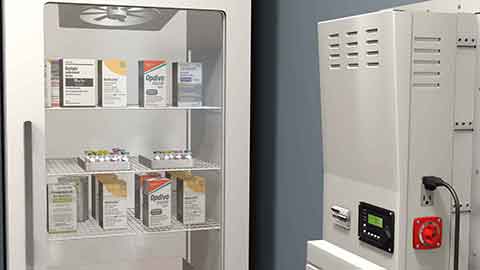How To Size An NFPA 99 Generator
The NFPA 99 Health Care Facilities Code requires all surgery centers to have an alternate source of power. The distribution system can be in the form of a generator set, or a battery backup system.
There are many variables to look out for when sizing an NFPA (National Fire Protection) Essential Electrical System (EES) for a surgical suite. If not thought through properly, the result could be the costly purchase of larger system with more power than needed, or an undersized system with too little power.
Often we will find a doctor will hire an electrician who simply finds the amperage for each piece of equipment, and totals it up. A calculation is then made for running the total amperage at full load for the required 2 hour run time. The real power consumption for a surgical procedure would be significantly less, as not every piece of equipment will run constantly throughout the operation.
Here are the steps that need to be taken:
1) Determine the Type of Power System:
The first consideration will need to be what type of power system is needed. This will be determined by what the NFPA 99 are, and what the Accreditation Requirements are. These performance requirements will often be dependent on the the type of surgery center being used, and the risk category of the operation being performed.
For smaller Office-Based Centers in which more minor surgeries are being performed, often a Type 3 System can be used.
For Ambulatory Surgery Centers in which critical surgeries will take place, involving the possibility of major injury or loss of life, a Type 1 System will be required. It is also worth mentioning that for any practice receiving Medicare payments, a Type 1 System will be required regardless. You can learn more about power system types in our Surgery Center Planning Guide.
2) Determine The Load:
Consider the equipment that will needed in the event of a power failure during a surgical procedure, and list each one out. If you are a consultant, architect or an electrician you may need to go over this with the doctor or his/her accreditation consultant.
Once you have come up with an equipment list to review, consider whether each piece of equipment is an absolute must have or not. Generally these will only be pieces of equipment that pertain to patient safety.
Including unnecessary equipment in your calculation could vastly change the size of the UPS system needed, and can run up the size and cost of the system significantly. You might what to view the physicians’ specialty page on our website to see what equipment is typically provided provided power to, for each surgical specialty.
You should also think about which equipment will be running simultaneously. For example - if you are considering running a surgery table, it may only ever get momentary usage, and often when none of the other equipment is on. So accounting for this can reduce required KVA or wattage the system needs put out.
3) Determine Item Run-Times:
This variable may have drastic effect on the battery bank size. For example - an electrocautery unit gets momentary usage throughout the surgery, and may only used for about 30 minutes of the 2 hour long procedure.
List out a safe run-time per item to help determine how large your battery bank should be.
4) Power Requirements and Conditioning:
It is important to be sure what voltage all your equipment runs at. If there are any 220 volt loads, special provisions may have to be made for this. Additionally some electronic equipment such as C-Arms and lasers will not accept modified sine-wave power and can only run on a pure sine waveform.
Request Help From Our Experienced Team
All this may seem daunting if you do not have much experience with electrical power. However, our engineers at Medi-Products are very familiar with medical equipment, and will be happy to help assist you in determining your power requirements and sizing your power system.


